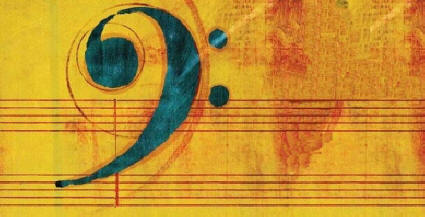| Music is, first and foremost, to be heard Can you analyze music just by hearing it? Of course you can. You do it all the time. We are analyzing when we listen to music and say "That's country"  or "That's jazz." or "That's jazz."  We are analyzing the elements we hear to make those distinctions.
The mark of a scholar (that's you) is to be able to articulate
what you hear. I'm not talking about the stilted, boring type of analysis writing. The following paragraph is lifted from an article you will read next week, but is a good example
of what I am NOT looking for: | After that cadence, an abrupt modulation to the flat submediant is followed by an expanded twopart song form in A-flat major characterized by modal mixtures on the 3rd, 6th, and 7th scale degrees. The first phrase is seven measures long with an expansion from second to fourth measures and modulates from the flat submediant to the sharp subdominant after a short transitory modulation in D-sharp minor, characterized by the usage of motive ‘x’ (but in its inverted form, as described above) and contrapuntally melded into motive ‘y2’ in the flat supertonic of the mediant, which is then treated sequentially (tonal sequences, of course) and then the passage ends on the afterbeat of the third beat of the measure. Of course motive ‘y3’ is heard throughout, while the viola is tacet for the following five measures but was probably omitted due to a copyist’s error, and not in the original autograph or any of the earliest published manuscripts, as witnessed in critical notes to the Barenreiter Critical Edition Vol. 346F. |

| | | | | | | You may be familiar with Pandora. You pick a song or an artist and create a "station." Then based upon their analyses of thousands (millions by now?) of songs, they play similar songs for you. Pandora won't share  its 400 plus criteria that they use to analyze each song, but those criteria fall under some general categories. its 400 plus criteria that they use to analyze each song, but those criteria fall under some general categories. The musicologists at Pandora listen for: Structure/Composition Rhythm/Meter Ostinato Roots Tonality Texture Harmony Form Sonority Instrumentation Feel Musical Qualities Leanings/Stylings Recording Techniques Influences Instrumental Ensembles Individual Instruments Lyrical Content Vocals Other
|
Here are a few of the more specific criteria that I ran across in researching Pandora: | extensive vamping interesting part writing use of strings mystical qualities heavy use of noise effects industrial altered vocal sound middle eastern influence dominant use of harmony lyric-centered composition major tonality smooth jazz influences well-articulated guitar solo strong melodies thru-composed melodic style verse-chorus twelve-eight time signature use of vocal counterpoint block piano chords west cost rap roots world music influences Brazilian jazz influences flat-out funky grooves danceable beats breathy male vocal tight kick sound emotional male lead vocal explicit lyrics offensive lyrics romantic lyrics male lead vocalist female lead vocalist wide vocal range narrow vocal range | reggae feel prominent organ acoustic orchestral electric experimental sounds triple note feel acoustic rhythm guitars electric guitar riffs vocal-centric aesthetic mixed acoustic and electric instrumentation extensive vamping abstract lyrics repetitive melodic phrasing subtle use of vocal harmony basic rock song structures vocal harmony electronica danceable beat thin orchestration breathy vocals hip-hop roots minimalist dominant bass riff multi-movement work syncopation diatonic chromatic modal atonal dissonant ostinati used complex meters dark mood | OK, you get the idea. Each song has many specific characteristics. This goes way beyond "That's country" or "That's jazz." Think of it this way. If you had to describe a piece of music to someone who could not hear it, how could you accurately articulate that in writing? This is harder than you think. What if you you could not use any 'genre' terms, but could only describe the music using descriptors like those above. Would your reader be able to guess the genre? Then there is the concept that your perception of the music is unique. In describing and drawing conclusions based entirely upon listening, you are creating a narrative that will be different from any other person's concept of that piece of music. Your musicianship that leads you to experience the music and then articulate that experience is a creation in itself! 


Created and maintained by Vicky V. Johnson |
|
